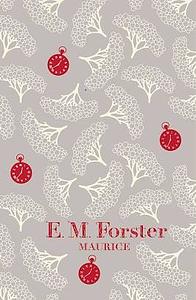Take a photo of a barcode or cover
Wanted to take some time to process this book before writing my review.
It is a classic of queer literature and I thoroughly enjoyed it. It loses a star for the portrayal of Alec, who is very much characterised as different to Maurice and Clive due to his class.
Given its time setting, the ending and the lack of reference to WW1, it very much has the air of a fairytale about it, although I found this to be a plus rather than a negative.
It is a classic of queer literature and I thoroughly enjoyed it. It loses a star for the portrayal of Alec, who is very much characterised as different to Maurice and Clive due to his class.
Given its time setting, the ending and the lack of reference to WW1, it very much has the air of a fairytale about it, although I found this to be a plus rather than a negative.
emotional
hopeful
lighthearted
medium-paced
Plot or Character Driven:
Character
Strong character development:
Yes
Loveable characters:
Yes
Diverse cast of characters:
Complicated
Flaws of characters a main focus:
Yes
A classic I’ve actually never watched or read before now! Forster’s language and prose rhythm are very much of the time it was first written in 1913, but the glimpses it offers of the upper middle class and upper class in the waning days of old England before WWI are fascinating, and it manages to be alluringly oblique and direct by turns on the matter of homosexual desire (both romantic and sexual) and social relations in general. Maurice is fatuous and insightful by turns, both terrible and pathetic, but what he undoubtedly is is gay, and his acknowledgment of this fact after some internal anguish is immensely cathartic, as is his ambiguously happy ending, such a rarity for queer literature until very recently. A quick read, but a good one when you’re in the mood for a period piece and wrangling with self-doubt and self-hatred that eventually breaks free.
emotional
hopeful
reflective
sad
slow-paced
Plot or Character Driven:
Character
Strong character development:
Yes
Loveable characters:
Complicated
Diverse cast of characters:
No
Flaws of characters a main focus:
Yes
I've been meaning to read this for a long time! First Forster I've read, and two pages in I was blown away by the sheer beauty of the writing. Clearly obvious why he's in the classics section...
Maybe it was me reading this within 24h or the book itself, but the pacing felt unbalanced and the narration felt overly rushed at points. The end note is right, sadly: Forster's fear of the book's appeal as a period piece is indeed its overriding appeal in 2014. But it was refreshing to read a book that dealt with homosexuality in a non-negative, natural light, having been written in 1913/1914.
A hundred years later, being criticised by a woman sitting on a 9h train ride. Forster would be disgruntled, I've no doubt.
Maybe it was me reading this within 24h or the book itself, but the pacing felt unbalanced and the narration felt overly rushed at points. The end note is right, sadly: Forster's fear of the book's appeal as a period piece is indeed its overriding appeal in 2014. But it was refreshing to read a book that dealt with homosexuality in a non-negative, natural light, having been written in 1913/1914.
A hundred years later, being criticised by a woman sitting on a 9h train ride. Forster would be disgruntled, I've no doubt.
adventurous
challenging
emotional
hopeful
reflective
sad
slow-paced
Plot or Character Driven:
Character
Strong character development:
Yes
Loveable characters:
Complicated
Diverse cast of characters:
No
Flaws of characters a main focus:
Yes
Maurice is a very dated book, even the author admits that in the endnote, written around 1960 (the manuscript itself was written in 1913-14). It is a period piece, full of social connections, assumptions, and restrictions that are alien to a 21st C reader, and it can sometimes be hard to fathom the meaning or motivation behind some of the characters' decisions and actions.
That said, it is a deeply true, authentic story of being closeted that feels entirely relatable, depsite being over 100 years old.
Maurice is a painfully lonely, isolated, and often unlikeable man who struggles towards happiness, raging agianst his inability to find or secure it, lashing out against the people around him who often have nothing to do with his pain, and trying to numb himself to his emotional needs. Despite his snobbishness and unpleasantness, I rooted for him throughout and was not disappointed by the ending.
That said, it is a deeply true, authentic story of being closeted that feels entirely relatable, depsite being over 100 years old.
Maurice is a painfully lonely, isolated, and often unlikeable man who struggles towards happiness, raging agianst his inability to find or secure it, lashing out against the people around him who often have nothing to do with his pain, and trying to numb himself to his emotional needs. Despite his snobbishness and unpleasantness, I rooted for him throughout and was not disappointed by the ending.
Graphic: Misogyny, Classism
Moderate: Homophobia
Minor: Suicidal thoughts
This was an important book, it deserves classic status and is a piece to the time it was written. It’s deeper than at first blush, but for me I did not love it. I liked it at parts but was so sad and pretty depressing in atmosphere (as the times would call for), but I never liked Maurice as a character.
It does make me longer to read none romance period pieces though.
It does make me longer to read none romance period pieces though.
dark
emotional
hopeful
reflective
medium-paced
Plot or Character Driven:
A mix
Strong character development:
Yes
Loveable characters:
Yes
Diverse cast of characters:
No
Flaws of characters a main focus:
No
challenging
emotional
medium-paced
Plot or Character Driven:
Character
Strong character development:
Yes
Loveable characters:
Complicated
Diverse cast of characters:
No
Flaws of characters a main focus:
Complicated
Really impactful.
The older language was at times hard for me to understand, so there were certain things I didn't quite pick up on until I sought out clarification outside the text. Maurice isn't exactly a sympathetic character (misogynist, incredibly snobby about class), and yet I really felt for him in regards to his sexuality and his later struggles with (and acceptance of) it.
For a book like this to have been written in 1912 I found really groundbreaking (I'm sure others have said this as well, but I didn't expect it to be as groundbreaking as it was). For a gay character to have been written at that time who ends up fully accepting himself was really touching to read. I mean, that happy ending...! It was like something that could be commonplace in the modern day. I think we often talk of historical queers as having not had the same understanding of things as we do now, but this book shows that's not always the case. Maurice's realization that it's him who is free, and the others who are caged by society's rules... well, my generations version of that was the All The Things She Said music video. The world truly does belong to us.
This review is all over the place, but I found myself affected by this book much more than I expected to. The ending left me unbearably happy, is all I can say.
The older language was at times hard for me to understand, so there were certain things I didn't quite pick up on until I sought out clarification outside the text. Maurice isn't exactly a sympathetic character (misogynist, incredibly snobby about class), and yet I really felt for him in regards to his sexuality and his later struggles with (and acceptance of) it.
For a book like this to have been written in 1912 I found really groundbreaking (I'm sure others have said this as well, but I didn't expect it to be as groundbreaking as it was). For a gay character to have been written at that time who ends up fully accepting himself was really touching to read. I mean, that happy ending...! It was like something that could be commonplace in the modern day. I think we often talk of historical queers as having not had the same understanding of things as we do now, but this book shows that's not always the case. Maurice's realization that it's him who is free, and the others who are caged by society's rules... well, my generations version of that was the All The Things She Said music video. The world truly does belong to us.
This review is all over the place, but I found myself affected by this book much more than I expected to. The ending left me unbearably happy, is all I can say.
Graphic: Homophobia, Sexism, Classism





